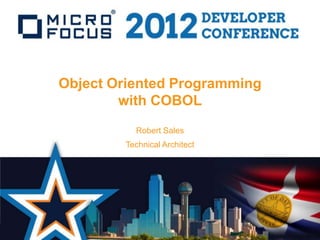
Object Oriented Programming with COBOL
- 1. Object Oriented Programming with COBOL Robert Sales Technical Architect
- 2. What is COBOL? • ANS85 COBOL – Remains the current standard for structure procedural COBOL programming. – Some features rarely used (nested programs?), but widely accepted and respected as an industry standard • Mainframe variants • Micro Focus, ACU, RM, Realia etc. etc. • ISO2002 2
- 3. What is COBOL’s future? • Accept that COBOL is essentially a procedural programming language • Embrace modern platforms and modern programming practices and make it easy for COBOL to participate. 3
- 4. Option 1: COBOL as procedural language • Widely used • Portable (except for the plethora of different dialects) • Efficient • BUT • MUCH less efficient development environment than those offered by modern platforms such as .NET and Java • Dwindling numbers of COBOL programmers 4
- 5. Option 2: embrace modern platforms • Far greater programming productivity • Seamless integration into modern programming platforms • BUT... • Can mean that programs are completely tied down to a single platform 5
- 6. So where do we go from here? • Two current major development platforms – .NET – Java/JVM – Allow fullest possible use of all features of target framework... – But at the same time allow for the greatest possible degree of portability. 6
- 7. Accessing .NET/JVM classes • To access a .NET or JVM type (i.e. a class, interface, enum etc.), use the TYPE keyword followed by the name of the type. • To access members of a type, use :: following the name of a type or an instance. • So, to define a data item to be an instance of a type: • 01 fred type System.String value “Hello world”. • Accessing instance method: • Display fred::Replace(“world”, “Dallas”) • Accessing instance property: • Display fred::Length • Accessing static method: • Display type System.String::Concat(fred, “ Texas”) 7
- 8. Non-portable example 01 s1 type System.String value “Hello world”. display s1::Substring(4) *> .NET System.String methods display s1::Substring(6, 5) display string::Concat (s1, “ and goodbye”) 01 s1 type java.lang.String value “Hello world”. display s1::substring(4) *> Java java.lang.String methods display s1::substring(6, 11) display s1::concat (“ and goodbye”) 8
- 9. Portable example • 01 s1 string value “Hello world”. display s1(5:) *> using reference modification display s1(7:5) display s1 & “ and goodbye” *> using concatenation 9
- 10. New in 2.0 - Portable syntax for accessing lists and dictionaries • Uses i-o verbs WRITE, READ, REWRITE AND DELETE to make it possible to write code using these collection classes, which is portable between .NET and JVM. • LIST and DICTIONARY become predefined types (in a similar way to STRING and DECIMAL), which allow the compiler to map implicitly onto the appropriate .NET or JVM type. • Specialized iteration syntax to normalize iteration through dictionaries 10
- 11. New in 2.0 – inline declaration of local variables • Can now declare local variables within the body of a method’s (or procedural COBOL’s) procedure division • Method-id m. • Procedure division. • declare i1 as binary-long = 3 • display i1 • perform varying i2 as binary-long from 1 by 1 until i2 = 8 • display i2 • end-perform • perform varying s as string through string-collection • display s • end-perform 11
- 12. New in 2.0 – access to indexers • In .NET, an indexer is a kind of property, except that unlike a normal property it has parameters. • It has a fixed name, and the idea is that you can access the indexer using subscript-like syntax on a type instance. We use square brackets to access indexers. 01 myList list[string]. 01 myDict Dictionary[string string]. display myList[0] *> use indexer to access 1st element display myDict[“Max”] *> access value with key “Max” 12
- 13. New in 2.0 – zero based subscripting using [...] • For consistency with the use of [...] to access indexers, we also allow the use of square brackets to do standard table access but zero based as opposed to one based. • 01 myArray string occurs 10. • 01 myList list[string]. • display myArray[0] *> first element of array • equivalent to... • display myArray(1) • display myList[0] *> first list element (via indexer) 13
- 14. New in 2.0 – declaring properties and indexers • PROPERTY-ID typespecifier • PROCEDURE DIVISION. • GETTER. • ... • SETTER. • ... • END PROPERTY. 14
- 15. New in 2.0 – declaring indexers • INDEXER-ID typespecifier • PROCEDURE DIVISION USING BY VALUE ... • GETTER. • ... • SETTER. • ... • END INDEXER. 15
- 16. In progress for 2.1 – simplified syntax for delegate creation. • Instead of: • 01 d type MyDelegate. • set d to new MyDelegate(self::m) • ...the method can be converted directly to a suitable delegate type: • set d to method self::m • Similarly for anonymous methods: • set d to delegate display “Hello world” end-delegate • ...instead of: • set d to new MyDelegate(delegate display “Hello world” end-delegate) 16
- 17. In progress for 2.1 – delegates and events on JVM • Unlike .NET, JVM has no direct support for delegates (or events, which are based on delegates). • We hope to make further progress on the goal of portable language by enabling use of delegates in JVM, but details of implementation are not yet tied down. 17
